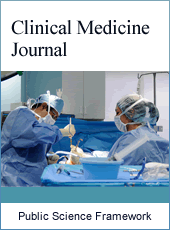Clinical Medicine Journal
Articles Information
Clinical Medicine Journal, Vol.1, No.3, Aug. 2015, Pub. Date: Jun. 13, 2015
The Relation Between Social Stressors and Inpatient Admissions Among Bipolar Disordered Clients Experiencing a Manic Episode: A Pilot Study
Pages: 110-114 Views: 4667 Downloads: 1074
[01]
Robert C. Schwartz, School of Counseling, University of Akron, Akron, Ohio, USA.
[02]
Doris Atanmo-Randolph, School of Counseling, University of Akron, Akron, Ohio, USA.
[03]
Christina Janevski, School of Counseling, University of Akron, Akron, Ohio, USA.
[04]
Sonya Thompkins, School of Counseling, University of Akron, Akron, Ohio, USA.
Little empirical research has been conducted on inpatient predictors among bipolar disordered persons experiencing a manic episode, in part because it is difficult to access this highly vulnerable patient population. Due to the often dangerous nature of manic episodes, for preventive and treatment purposes it is clinically important to better understand non-biological triggers of inpatient admissions. This study investigated whether social stressors predicted inpatient admissions among patients currently experiencing a manic episode. Multiple regression analyses (N = 56) showed that current interpersonal relationship problems and family environment problems both significantly correlated with the need for inpatient admissions. Initial evidence of this pilot study supports the possibility that inpatient admissions can be predicted by specific psychosocial stressors evaluated during a clinical interview.
Bipolar Disorder, Mania, Inpatient Admission, Predictor
[01]
American Psychiatric Association: Diagnostic and statistical manual of mental disorders (4th ed., Text revision). Washington, DC, Author, 2000.
[02]
First MB, Spitzer RL, Gibbon M, Williams JB: Structured clinical interview for Axis I DSM-IV disorders. State Psychiatric Institute, New York, NY, 1995.
[03]
Johnson SL, Roberts JE: Life events and disorder: Implications from biological theories. Psychol Bull 1995, 117: 434-449.
[04]
Judd LL, Akiskal HS, Schettler PJ, Endicott J, Leon AC, Solomon DA, Coryell W, Maser JD, Keller MB: Psychosocial disability in the course of bipolar I and II disorders. Arch Gen Psychiatry 2005, 62: 1322-1330.
[05]
Kennedy S, Thompson R, Stancer HC, Roy A, Persad E: Life events and Relapse in bipolar affective disorder. J Affect Disord 1983, 25: 13-20.
[06]
Kessing LV, Agerbo E, Mortensen PB: Major stressful life events and other risk factors for first admission with mania. Bipolar disorders 2004. 6: 122-129.
[07]
Leahy R: Bipolar disorder: causes, contexts, and treatments. J Clin Psychol 2007, 63: 417-424.
[08]
Mitchell PB, Malhi GS, Redwood BL: Summary of guideline for the treatment of bipolar disorder. Australas Psychiatry 2003, 11: 39-53.
[09]
National Institute of Mental Health. Bipolar disorder. Retrieved from http://www.nimh.nih.gov/health/publications/bipolar-disorder/index.shtml, 2009
[10]
Schnyder U, Valach L, Morgeli H, Heim E: Patient-disease characteristics and coping strategies predict hospitalization in emergency psychiatry. Inter J Psychiatry Med 1999, 29: 75-90.
[11]
Schwartz RC: Reliability and validity of the functional assessment rating scale. Psychol Rep 1999, 84: 389-391.
[12]
Ward JC, Dow MG: The functional assessment rating scale. University of South Florida Department of Community Mental Health, Tampa, FL, 1994.
[13]
Ward JC, Dow MG, Saunders T, Penner K, Halls S, Sachs-Ericsson N: Structured clinical interview for the functional assessment rating scale. University of South Florida Department of Community Mental Health, Tampa, FL, 1995.
[14]
Ward JC, Dow MG, Penner K, Saunders T, Halls S: Manual for using the functional assessment rating scale. University of South Florida Department of Mental Health Law and Policy, Tampa, FL, 2006.
[15]
Wellman N: Bipolar disorder. Primary Health Care 2007, 17: 31-34.

ISSN Print: 2381-7631
ISSN Online: 2381-764X
Current Issue:
Vol. 7, Issue 3, September Submit a Manuscript Join Editorial Board Join Reviewer Team
ISSN Online: 2381-764X
Current Issue:
Vol. 7, Issue 3, September Submit a Manuscript Join Editorial Board Join Reviewer Team
| About This Journal |
| All Issues |
| Open Access |
| Indexing |
| Payment Information |
| Author Guidelines |
| Review Process |
| Publication Ethics |
| Editorial Board |
| Peer Reviewers |


